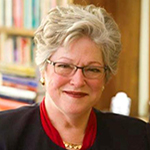By Molly T. Marshall
 Great movements arise out of passion. Whether it be concern for educating girls (Malala), eradicating the guinea worm (Carter Center), enhancing the lives of at-risk children (Edelman), empowering employees (Google) or energizing a moribund baseball team (Yost of my Royals), focused passion is necessary.
Great movements arise out of passion. Whether it be concern for educating girls (Malala), eradicating the guinea worm (Carter Center), enhancing the lives of at-risk children (Edelman), empowering employees (Google) or energizing a moribund baseball team (Yost of my Royals), focused passion is necessary.
Passion has fueled courageous and creative expressions of ministry. It propelled many of our forebears to cross oceans to proclaim the gospel; it prompted sacrificial giving to underwrite this witness; and it prepared others to follow their example. Narrations of these faithful ancestors continue to awaken present generations to service.
Sustaining passion is the challenge. Humans are vulnerable to discouragement, and when best efforts (albeit at times misguided) are turned aside, the blaze of earlier conviction may be extinguished. We marvel at stories of resilience and resolve and wonder how they persevered when obstacles seemed insurmountable. What fuels such burning passion and continues to spark transformation?
I spent a couple of days with a marketing consultant this past week as we strategized how to engage an increasingly secular landscape. He knew many important things like how to “build a brand,” how to shape language that awakens a longing for a life of significance, and how to articulate the global need for empathy, which can serve as an antidote to social aggression. I was a little skeptical, but even more impressed!
The values held by a theological school matter in the measure of human flourishing, but we often have trouble explaining what we are up to. Seminaries focus on helping individuals discover their deepest longing and desire, and we believe that God’s calling is always about participating in God’s mission to redeem creation.
As we talked about making theological education more accessible and inviting, the consultant suggested that we find persons who are passionate about bringing about change, those who are fired up about the possibility of re-setting the board being played. Internally I found myself asking: “Where is this kind of fire?” Arguably, this is the most important question as schools and churches seek to kindle flames of renewal.
In his interpretation of Christian spirituality, Holy Longing, Ronald Rolheiser reflects on the unwieldy character of fire as desire for fullness of life in union with God.
There is within us … an unquenchable fire that renders us incapable, in this life, of ever coming to full peace. Spirituality is, ultimately, about what we do with that desire … and what we do with our unrest.
Holy unrest and longing to change the world fans the flame of vocation. I remember the earnestness with which I answered a calling to ministry, the joy and hope that this decision provided. When I presented myself for membership in the Ministerial Alliance at Oklahoma Baptist University, there was, shall I say, underwhelming enthusiasm, but at least no one got out a theological fire hose to extinguish my ardor; that attempt would come later. My ministerial colleagues and I believed that we were called to “set the world on fire,” in the words of Ignatius, and with youthful idealism, we chased after ministry.
Our ecclesial world has changed in these past decades as the structures that support ministry — mission boards, regional judicatories and once flourishing churches — have experienced cultural shifts that displace their purchase on religious vocations. This past week Religion and Ethics posted an article on the diminishing job prospects for Protestant pastors, which is hardly good or new news.
Indeed, many congregations no longer find encouraging persons to think of professional ministry as a part of their regular discipleship education. I think they are fearful of the load pastors haul, and they have seen up close the burdens that can dim the glow of their leader’s earlier commitment. We all know the statistics about clergy burnout and the unhealthy patterns that contribute.
All of this data notwithstanding, God continues to ignite a restless longing to “put the world to rights,” in the language of N. T. Wright. A life “curved in upon oneself,” the language Augustine used to describe a sinful and diminished life, does not bear the fullness of the image of God. Longing that brings us closer to God and others can power the metamorphosis of glory that shimmers with energy for fullness of life.
Tending this fire requires lives of prayer, treasured companions and clear recognition that though “our outer nature is wasting away, our inner nature is being renewed every day” (2 Cor. 4:16 b). It is God’s faithfulness that sustains our passion. Thus, we do not lose heart.
